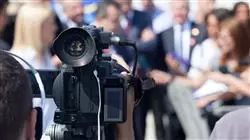University certificate
The world's largest faculty of journalism and communication”
Introduction to the Program
Become an excellent Journalist and learn how to tell what is happening in the world"

Journalism studies are one of the most demanded in all universities, since this profession has a great influence on the population and has gained a great prominence since its beginnings. Journalism involves different branches: social, cultural, economic, sports, international, events, etc. This makes it necessary for professionals in this sector to specialize in order to tell stories in the most appropriate way in each case.
Additionally, the transmission of information can be carried out through different media. Specifically, this program aims to specialize students in Journalistic Deontology . To do so, it is necessary to acquire a series of skills that allow you to put into practice all that has been learned.
The syllabus covers everything related to Journalistic Deontology . Thus, you will be able to study the relationship between ethics and Deontology, the fields in which Journalists must be especially sensitive or the profession's deontological codes, for example.
This program is the most complete and directed so that the professional in the field of Journalism and communication reach a higher level of performance, based on the fundamentals and latest trends from the media. Take advantage of the opportunity and become a professional with solid foundations through this academic program and the latest educational technology 100% online.
This program will allow you to improve your skills and become a successful journalist”
This Postgraduate certificate in Journalistic Deontology contains the most complete and up-to-date program on the market. The most important features include:
- Practical case studies are presented by experts in Journalistic Deontology
- The graphic, schematic, and practical contents with which they are created provide scientific and practical information on the disciplines that are essential for professional practice
- Practical exercises where self-assessment can be used to improve learning
- Its special emphasis on innovative methodologies in Journalistic Deontology
- Algorithm-based interactive learning system for decision-making in the situations that are presented to the student
- Theoretical lessons, questions to the expert, debate forums on controversial topics, and individual reflection assignments
- Content that is accessible from any fixed or portable device with an Internet connection
We use the best educational methodology that will help you prepare in a practical and comfortable way”
Its teaching staff includes professionals belonging to the world of journalism, who bring to this program the experience of their work, as well as recognized specialists from prestigious reference societies and universities.
Its multimedia content, developed with the latest educational technology, will enable the professional to contextual and situated learning, i.e., a simulated environment that will provide immersive learning programmed to be prepared for real situations.
This program is designed around Problem-Based Learning, whereby the professional must try to solve the different professional practice situations that arise throughout the program. For this purpose, the professionals will be assisted by an innovative interactive video system developed by renowned experts in Journalistic Deontology with extensive experience in the field.
Don't miss the opportunity to enhance your skills in Journalistic Deontology "

Join our community of students and acquire the most advanced knowledge in your career"
Why study at TECH?
TECH is the world’s largest online university. With an impressive catalog of more than 14,000 university programs available in 11 languages, it is positioned as a leader in employability, with a 99% job placement rate. In addition, it relies on an enormous faculty of more than 6,000 professors of the highest international renown.

Study at the world's largest online university and guarantee your professional success. The future starts at TECH”
The world’s best online university according to FORBES
The prestigious Forbes magazine, specialized in business and finance, has highlighted TECH as “the world's best online university” This is what they have recently stated in an article in their digital edition in which they echo the success story of this institution, “thanks to the academic offer it provides, the selection of its teaching staff, and an innovative learning method aimed at educating the professionals of the future”
A revolutionary study method, a cutting-edge faculty and a practical focus: the key to TECH's success.
The most complete study plans on the university scene
TECH offers the most complete study plans on the university scene, with syllabuses that cover fundamental concepts and, at the same time, the main scientific advances in their specific scientific areas. In addition, these programs are continuously being updated to guarantee students the academic vanguard and the most in-demand professional skills. In this way, the university's qualifications provide its graduates with a significant advantage to propel their careers to success.
TECH offers the most comprehensive and intensive study plans on the current university scene.
A world-class teaching staff
TECH's teaching staff is made up of more than 6,000 professors with the highest international recognition. Professors, researchers and top executives of multinational companies, including Isaiah Covington, performance coach of the Boston Celtics; Magda Romanska, principal investigator at Harvard MetaLAB; Ignacio Wistumba, chairman of the department of translational molecular pathology at MD Anderson Cancer Center; and D.W. Pine, creative director of TIME magazine, among others.
Internationally renowned experts, specialized in different branches of Health, Technology, Communication and Business, form part of the TECH faculty.
A unique learning method
TECH is the first university to use Relearning in all its programs. It is the best online learning methodology, accredited with international teaching quality certifications, provided by prestigious educational agencies. In addition, this disruptive educational model is complemented with the “Case Method”, thereby setting up a unique online teaching strategy. Innovative teaching resources are also implemented, including detailed videos, infographics and interactive summaries.
TECH combines Relearning and the Case Method in all its university programs to guarantee excellent theoretical and practical learning, studying whenever and wherever you want.
The world's largest online university
TECH is the world’s largest online university. We are the largest educational institution, with the best and widest online educational catalog, one hundred percent online and covering the vast majority of areas of knowledge. We offer a large selection of our own degrees and accredited online undergraduate and postgraduate degrees. In total, more than 14,000 university degrees, in eleven different languages, make us the largest educational largest in the world.
TECH has the world's most extensive catalog of academic and official programs, available in more than 11 languages.
Google Premier Partner
The American technology giant has awarded TECH the Google Google Premier Partner badge. This award, which is only available to 3% of the world's companies, highlights the efficient, flexible and tailored experience that this university provides to students. The recognition as a Google Premier Partner not only accredits the maximum rigor, performance and investment in TECH's digital infrastructures, but also places this university as one of the world's leading technology companies.
Google has positioned TECH in the top 3% of the world's most important technology companies by awarding it its Google Premier Partner badge.
The official online university of the NBA
TECH is the official online university of the NBA. Thanks to our agreement with the biggest league in basketball, we offer our students exclusive university programs, as well as a wide variety of educational resources focused on the business of the league and other areas of the sports industry. Each program is made up of a uniquely designed syllabus and features exceptional guest hosts: professionals with a distinguished sports background who will offer their expertise on the most relevant topics.
TECH has been selected by the NBA, the world's top basketball league, as its official online university.
The top-rated university by its students
Students have positioned TECH as the world's top-rated university on the main review websites, with a highest rating of 4.9 out of 5, obtained from more than 1,000 reviews. These results consolidate TECH as the benchmark university institution at an international level, reflecting the excellence and positive impact of its educational model.” reflecting the excellence and positive impact of its educational model.”
TECH is the world’s top-rated university by its students.
Leaders in employability
TECH has managed to become the leading university in employability. 99% of its students obtain jobs in the academic field they have studied, within one year of completing any of the university's programs. A similar number achieve immediate career enhancement. All this thanks to a study methodology that bases its effectiveness on the acquisition of practical skills, which are absolutely necessary for professional development.
99% of TECH graduates find a job within a year of completing their studies.
Postgraduate Certificate in Journalistic Deontology
Professional ethics is an issue of utmost importance in any field of work, but in journalism it takes on special relevance due to the impact that news has on society. For this reason, at TECH Global University we have developed a Postgraduate Certificate Journalistic Deontology to teach communication professionals about the ethical and moral principles that govern their daily activity. In this program, students will delve into the concepts of freedom of expression, privacy and confidentiality, social responsibility and professionalism. In addition, the importance of transparency in communication will be addressed and case studies will be analyzed to assess the ethical decisions that journalists must make in their daily work.
Journalism is a constantly evolving profession, which means that communication professionals must be in continuous education. In our Postgraduate Certificate Journalistic Deontology we will offer an update on the legal frameworks that govern journalistic activity and will delve into the new trends and technologies that are transforming the sector. We will also emphasize the importance of empathy and social responsibility in today's journalism. This program is an opportunity for working journalists, as well as for those who wish to receive education in the field of communication, to acquire the necessary tools to practice their profession with integrity and ethical commitment.







